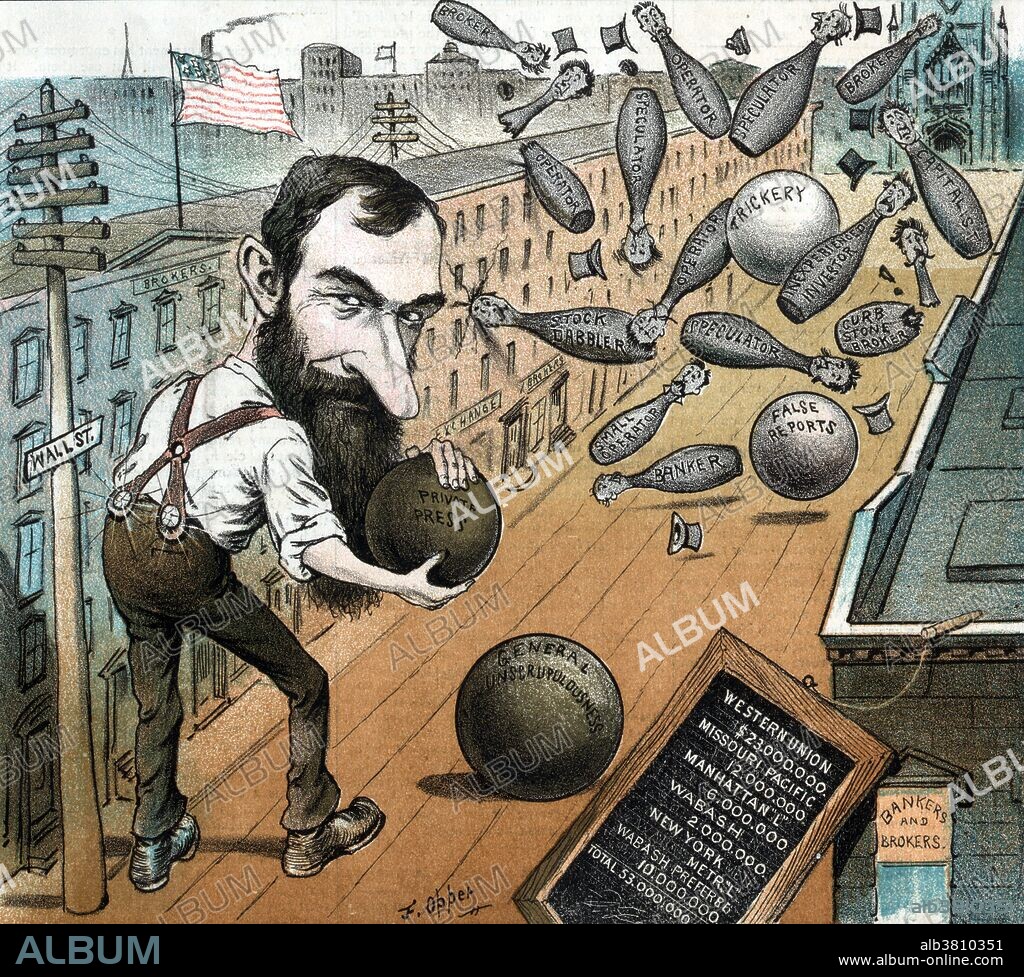alb3810351
Wall Street, Jay Gould's Bowling Alley, 1882

|
Add to another lightbox |
|
Add to another lightbox |



Title:
Wall Street, Jay Gould's Bowling Alley, 1882
Caption:
Wall Street, Jay Gould's private bowling alley. When Gould withdrew from management of the Union Pacific in 1883 amidst political controversy over its debts to the federal government, he realized a large profit for himself. Jason "Jay" Gould (May 27, 1836 - December 2, 1892) was a leading American railroad developer and speculator. He was long vilified as an archetypal robber baron. In 1859 Gould began speculative investing by buying stock in small railways. After being forced out of the Erie Railroad, in his 40s Gould started to build up a system of railroads in the Midwest and West. Beginning in 1879, he gained control of four western railroads. By 1880, he controlled 10,000 miles of railway, about 1/9th of the length of rail in the US at that time, and, by 1882, he had controlling interest in 15 percent of the country's tracks. He obtained a controlling interest in the Western Union telegraph company, and, after 1881, in the elevated railways in NYC. From 1868 to 1888, he was connected with many of the largest railway financial operations in the US. He died of tuberculosis in 1892 at the age of 56. His fortune was conservatively estimated at $72 million for tax purposes, which he willed in its entirety to his family. Chromolithograph by Frederick Burr Opper, published by Keppler & Schwarzmann, March 29, 1882.
Credit:
Album / LOC/Science Source
Releases:
Model: No - Property: No
Rights questions?
Rights questions?
Image size:
3900 x 3521 px | 39.3 MB
Print size:
33.0 x 29.8 cm | 13.0 x 11.7 in (300 dpi)
Keywords:
1880S • 1882 • 19TH CENTURY • AMERICA • AMERICAN • ART • ARTWORK • BOWLING ALLEY • BUSINESS • CARICATURE • CARTOON • CELEBRITIES • CELEBRITY • CHROMOLITHOGRAPH • CHROMOLITHOGRAPHY • CONTROVERSIAL • COVER ART • DOWNTOWN • DRAWING • ECONOMIC CRISIS • FAMOUS PEOPLE • FAMOUS • FIGURE • FRONT COVER • GILDED AGE • GOULD • HISTORIC • HISTORICAL • HISTORY • ILLUSTRATION • ILLUSTRATIONS • IMPORTANT • JASON GOULD • JAY GOULD • LITHOGRAPH • MALE • MAN • MANHATTAN • MEN • MILLIONAIRE • MONOPOLIST • NEW YORK CITY • NOTABLE • NY • NYC • PEOPLE • PERSON • PERSONALITIES • PERSONALITY • PUCK MAGAZINE • RAILROAD DEVELOPER • RAILROAD MAN • RAILROADS • ROBBER BARON • ROBBER KNIGHT • SATIRE • SATIRIC • SATIRICAL • SATIRIZATION • SATIRIZE • SKITTLE ALLEY • SPECULATOR • STOCK MANIPULATION • STOCK MANIPULATOR • TRANSPORTATION • UNITED STATES • US • USA • WALL STREET • WELL-KNOWN
 Pinterest
Pinterest Twitter
Twitter Facebook
Facebook Copy link
Copy link Email
Email

